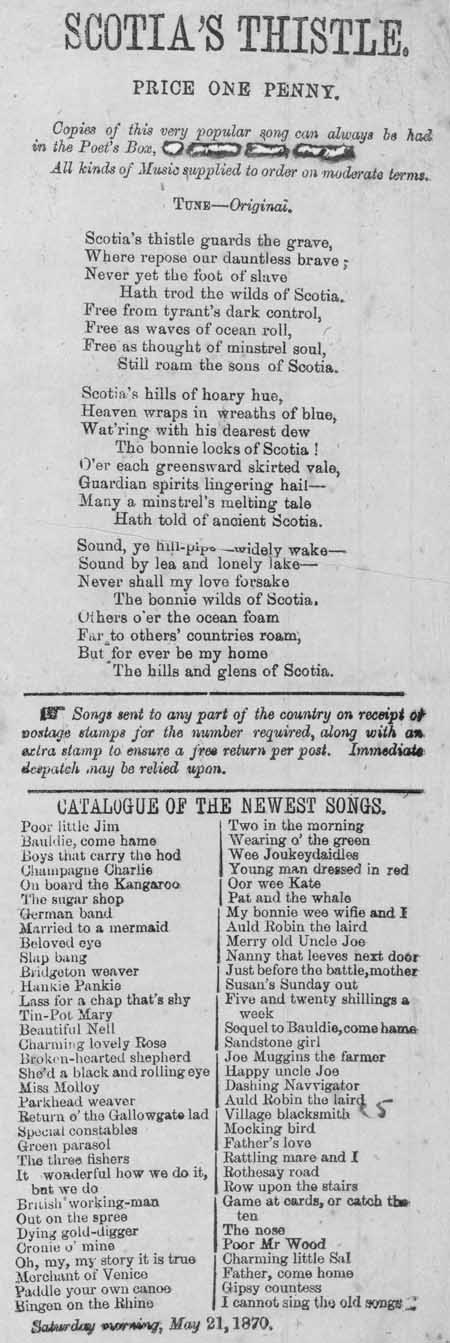Commentary
Verse 1: 'Scotia's thistles guard the grave, / Where repose our dauntless brave; / Never yet the foot of slave / Hath trod the wilds of Scotia. / Free from tyrant's dark control, / Free as waves of ocean roll, / Free as thought of minstrel soul, / Still roam the sons of Scotia.' This broadside was priced at one penny and published on Saturday, 21st May 1870, by the Poet's Box. The town of publication has been obscured, but was probably Glasgow. Legend has it that the thistle was adopted as Scotland's national emblem after a Viking invading party, approaching Scottish warriors by night, crept into a patch of thistles and began to cry out in pain, alerting the Scots to their whereabouts. Since then, the thistle has represented Scotland in artwork, advertising, football club names and many songs and poems. Perhaps the most famous usage is in 'A Drunk Man Looks at the Thistle' by Hugh MacDiarmid (1892-1978). Published in 1926, it is an epic dissection of the Scottish character. 'Scotia's Thistle' is an earlier, less ambitious tribute to the beauty and independent spirit of Scotland.
The Poet?s Box in Glasgow operated from 1849 to 1911. Matthew Leitch was the proprietor at 6 St. Andrew Lane?s, a narrow street on the south side of Gallowgate, from 1850 to 1858. His son William Munsie Leitch worked at the same address from 1859 to 1865 and at varous addresses in London Street until 1911. Many of the broadsides published by the Glasgow Poet?s Box were dated and some carried advertisements, not just for printed items but also for shoe blacking and ?soap for lovers?! Like the other ?boxes? in Dundee and Edinburgh, the Glasgow one sold love songs, sea shanties, parodies and dialogues. It is not clear what the connection between the different Poet?s Boxes were. They almost certainly sold each other?s sheets. It is known that John Sanderson in Edinburgh often wrote to the Leitches in Glasgow for songs and that later his brother Charles obtained copies of songs from the Dundee Poet?s Box. There was also a Poet?s Box in Belfast from 1846 to 1856 at the address of the printer James Moore, and one in Paisley in the early 1850s owned by William Anderson.
Early ballads were dramatic or humorous narrative songs derived from folk culture that predated printing. Originally perpetuated by word of mouth, many ballads survive because they were recorded on broadsides. Musical notation was rarely printed, as tunes were usually established favourites. The term 'ballad' eventually applied more broadly to any kind of topical or popular verse.
View Transcription | Download PDF Facsimile
|
 |
Date of publication:
1870 shelfmark: L.C.1269(175b)
 View larger image
View larger image
|


